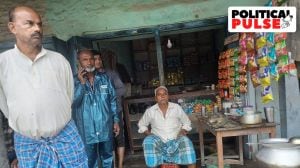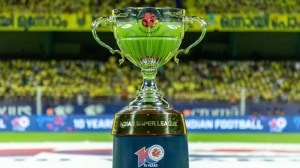‘Gratitude isn’t India’s outstanding quality’
Continuing excerpts from Fakir Syed Aijazuddin’s The White House & Pakistan: Secret Declassified Documents, 1969-1974. In this conversa...

Continuing excerpts from Fakir Syed Aijazuddin’s The White House & Pakistan: Secret Declassified Documents, 1969-1974. In this conversation, dated October 22, 1971, Henry Kissinger, then adviser to US President Richard Nixon, tells Chinese Prime Minister Chou En-lai that while the US has “no national interest” in East Pakistan, it is “totally opposed to Indian military action against Pakistan”.
CHOU: There are even fewer members on your team.
KISSINGER: I am afraid you will want agreement by vote.
CHOU: That will never happen. We want agreement by consultations. I was afraid the wind was too great at the Great Wall today.
KISSINGER: It was very impressive.
CHOU: We hope we will be able to reach a certain stage in our political discussions today. I think the main issued to be discussed are Korea, Japan and the issue of the subcontinent of Asia. I have heard that your preference is to speak about the questions of relations between the US and the Soviet Union, or the Soviet Union, at a more general meeting and we agree and think it will be all right.
CHOU: My preference is to discuss the Soviet Union at a more restricted meeting while Japan and Korea I don’t mind discussing at a more general meeting.
CHOU: Then I was misinformed.
KISSINGER: I expressed myself with my usual lack of clarity. (laughter) At Harvard complicated sentences are considered profound. (laughter)
CHOU: British style, isn’t it? Is Harvard more like Oxford or Cambridge in comparison with Yale?
KISSINGER: I would not admit, Mr Prime Minister, that you can compare Harvard and Yale.KISSINGER: Our view is…
CHOU: You know about the letter Kosygin (the then Soviet Premier) sent to President Yahya?
KISSINGER: No, when?
CHOU: October 7. Maybe you haven’t learnt about it yet.
KISSINGER: All I know is that the Soviet Union claimed it urged restraint from both sides.
CHOU: It was you who suggested both sides withdraw a safe distance.
KISSINGER: As I told you.
CHOU: Pakistan accepted, but it is not the method of the Soviet Union. But the Soviet Union is threatening Pakistan.
KISSINGER: I have not seen the text of the letter.
CHOU: We just learned about this recently. What is your estimate? You said on your arrival you thought there was danger.
KISSINGER: My estimate is that at first the flood of refugees caused a problem for India. They had a reasonable complaint at the beginning that the flood of refugees would upset the balance in Bengal. Since then, and we have responded by making available—over half of all assistance given to the refugees of India comes from the United States—we have already given $300 million for the refugees.
CHOU: How much did the Soviet Union give?
KISSINGER: Much less. Less than $100 million. Maybe $50-60 million is my recollection. It’s much less.
On the other hand, I read the book by Maxwell that the Prime Minister recommended to me the last time, and it is our view, certainly at the White House, that the Indians are typically applying the same tactics to that situation as they did to you.
CHOU: That is their tradition.
KISSINGER: It is our judgement that the Indians see in situation no longer as a legal problem of East Pakistan but an opportunity to settle the whole problem of Pakistan which they have never accepted. Their strategy in doing this is to force so abrupt a change in the situation in East Pakistan, and by such methods, that it will weaken the fabric of West Pakistan. And they are encouraged in this tendency by what they believe to be the support of some outside countries.
CHOU: Quite a big encouragement.
KISSINGER: As far as the policy of the United States is concerned, we are the only major western country that has not condemned Pakistan. It is only because of us, and I may say over the opposition from the pro-Indian element of our government, that the consortium has not cut off aid to Pakistan. And we will bring about now a $90 million debt relief for Pakistan. And we have in the form of relief made available $250 million of other funds.
We are totally opposed to Indian military action against Pakistan. I do not normally see ambassadors, but I have warned the Indian ambassador on behalf of the President that if there was an attack by India we will cut off all economic aid to India. We have told the Russians of our view, and they have told us they are trying to restrain the situation, but I am not sure that I believe them. We believe that there is a good chance that Indian will either attack or provoke Pakistan in a month or two. We told President Yahya that I would discuss this with you when I was here, and I simply want you to know that we are totally opposed to it, and we are ready to listen to any proposal that you will like to make.
We have urged President Yahya to withdraw his force some distance from the borders and also to make some political offer in order to overcome the propaganda that is so systematically made against her and in order to support her at the United Nations and in order to support her in the United Nations and elsewhere.
Mrs Gandhi is supposed to come to the United States November 4 and 5, and if she comes and there is no war by then, the President will speak to her in the strongest possible terms. We would be very grateful for your views.
CHOU: We will make a further study of this matter before telling you. Because we hadn’t known until quite recently this letter from Kosygin to President Yahya which has the nature of an ultimatum.
KISSINGER: Really.
CHOU: I have not studied it because I just learnt it some time ago. When Marshal Tito went to India he went as a mediator, but he was persuaded by Mrs Gandhi.
KISSINGER: I saw that.
CHOU: As Madame Gandhi had already visited Moscow and also this visit by Tito, it may further add to her miscalculations. So maybe we can discuss tomorrow or the day after.
KISSINGER: It will be helpful to determine our actions also.
CHOU: We from the East and you from the West have the most to do with East Pakistan and we understand best the traditions of India. After having read the book by Maxwell you also believe it is the traditional policy of India—she doesn’t agree the Kashmir problem is solved and she doesn’t believe in the existence of Pakistan.
KISSINGER: We believe she will try to destroy East Pakistan. We have no national interest in East Pakistan. We want it to reflect the will of the people. We have no interest whether it stays with Pakistan or not. We have made many proposals to India by which we will separate the problem of refugees from the political evolution of East Pakistan and which will not prejudge the situation. But India has kept making demands which they know President Yahya will not accept and which would force a solution in so short a time frame that it will have the effect of destroying the structure of West Pakistan also. That’s the nature of the present problem.
CHOU: And to add to that the desire of the Soviet Union to exploit the situation and the contradiction in Asia, as as to give it a free hand in Europe. This is a very stupid way of thinking.
KISSINGER: Gratitude is not the outstanding quality of India, as Moscow will learn. (laughter).
CHOU: That is because the Soviet policies have not really been to help the people gain national independence. Let’s go the Soviet Union, I would like to hear your views.
(The White House & Pakistan: Secret Declassified Documents, 1969-1974 by Fakir Syed Aijazuddin, Oxford University Press )
Part I: ‘India should leave its neighbours alone’



- 01
- 02
- 03
- 04
- 05




























